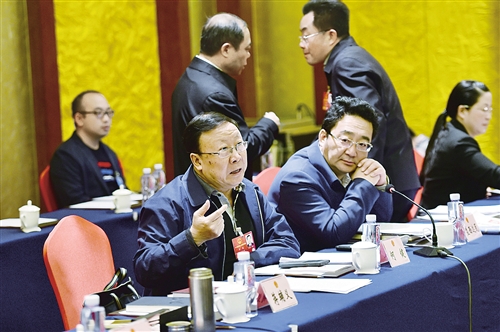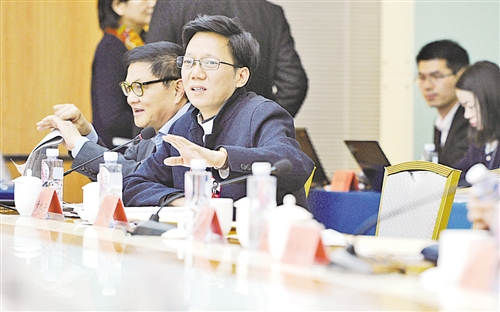On the new urbanization and the development of real estate market: both "city" and "house" must be people-oriented

On March 11th, He Jian (first from left), deputy to the National People’s Congress and director of the Housing and Urban-Rural Development Department of Sichuan Province, and representatives from the same delegation discussed that the key to new urbanization is the citizenization of agricultural transfer population. Photo by our reporter Li Jinglu

On the afternoon of March 11th, Huang Hongyun, member of Chinese People’s Political Consultative Conference and chairman of Chongqing Federation of Industry and Commerce, believed that housing enterprises needed to strengthen product innovation. Our reporter Li Shugui photo
(Reporter Lin Huocan, Cui Wenyuan, He Wei, Liu Chang, Wu Bingze) The government work report pointed out that urbanization is the only way to modernization and the biggest domestic demand potential and development momentum in China. In the process of promoting new urbanization, how to deal with the stable and healthy development of the real estate market? The reporter of Economic Daily interviewed the delegates and members attending the two sessions of the National People’s Congress. They believe that only by adhering to "people-oriented" can new urbanization and real estate market achieve win-win development.
Encourage agricultural transfer population to buy houses in cities.
According to the government work report, this year, China will further promote new urbanization, focusing on three tasks: urbanization of agricultural transfer population, promoting the construction of urban affordable housing projects and the stable and healthy development of the real estate market, and strengthening the management of urban planning and construction.
"Real estate enterprises should seize the opportunity brought by promoting new urbanization and share the market brought by the urbanization of agricultural transfer population ‘ Cake ’ 。” Chi Fulin, member of Chinese People’s Political Consultative Conference and president of China (Hainan) Reform and Development Research Institute, said that by 2020, China’s urbanization rate may exceed 60%, which is expected to bring about 3.3 trillion yuan of new consumption, and housing consumption will become an important part of new consumption.
Hu Baosen, deputy to the National People’s Congress and chairman of the board of directors of Jianye Group, said that at present, China’s real estate market is clearly divided, and the pressure of real estate destocking in third-and fourth-tier cities is relatively high. However, from the perspective of urbanization, a large number of agricultural migrants will settle in third-and fourth-tier cities, which will bring huge housing demand. In this sense, new urbanization will become the only way to realize the stable and healthy development of China’s real estate market.
In order to further encourage the vast number of migrant workers to buy houses in cities, many places have shown "real tricks" to help the agricultural transfer population accelerate the process of citizenization.
Fan Ping, deputy to the National People’s Congress and director of the Enterprise Management Center of Sichuan Jinxing Clean Energy Equipment Co., Ltd., said that as early as 2014, Meishan City, Sichuan Province launched an initiative to encourage migrant workers to buy houses in cities. For example, the "3+2" housing subsidy policy is implemented, that is, the government subsidizes 300 yuan per square meter of rural residents’ housing purchase, and enterprises give preferential treatment to 200 yuan.
"This subsidy policy has played a very positive role in stimulating farmers’ enthusiasm for buying houses in cities." Deputy Fan Ping said that the process of "destocking" in Meishan City is accelerating, and the destocking cycle has been shortened from 21 months at the end of April 2015 to about 14 months at present.
Open the conversion channel between commercial housing and affordable housing
With the acceleration of new urbanization, all localities should not only accelerate the transformation of shanty towns and villages in cities, but also solve the housing security problem of a large number of rural migrants.
However, it is not difficult to complete the task of providing affordable housing through government self-construction. Deputy Hu Baosen said that at present, there is a certain gap between the government-built policy housing and the needs of the people, while the commercial housing at the forefront of the market can better grasp the needs of the people in terms of apartment type, area and site selection.
Therefore, opening the channel between commercial housing and affordable housing, and the government repurchasing commercial housing as affordable housing, has become an important exploration to promote the construction of affordable housing projects in cities and towns and the stable and healthy development of the real estate market.
Ni Qiang, deputy to the National People’s Congress and mayor of Haikou City, said that at present, there are plenty of public rental housing in Haikou City, but the people’s application enthusiasm is not high and the inventory is large. The government has cancelled the construction of public rental housing and switched to a two-way conversion channel between affordable housing and commercial housing to digest the inventory of affordable housing and commercial housing.
"We are fully implementing the monetization subsidy policy for public rental housing, expanding the scope of public rental housing protection to non-registered population, and including urban lower-middle and low-income families with housing difficulties, newly employed employees, migrant workers and migrant workers into the scope of public rental housing protection." Deputy Ni Qiang said that in order to further intensify the destocking, Haikou City carried out the reform of the household registration system, making it clear that foreign household registration personnel over the age of 18 can apply for affordable housing such as price-limited commercial housing and low-rent housing if they have lived in Haikou City for more than 8 years.
Zheng Xincong, deputy to the National People’s Congress and secretary of the Quanzhou Municipal Party Committee of Fujian Province, said that Quanzhou has issued an implementation plan to open the transition channel between commercial housing, affordable housing and resettlement housing. Some counties in Quanzhou are moderately repurchased by the government as affordable housing such as resettlement houses.
"We gradually pay equal attention to physical security and monetary subsidies, and encourage those who meet the conditions of public rental housing to rent first-hand commercial housing. The municipal finance will give 30% rent subsidies, and encourage those who meet the conditions of price-limited housing to buy first-hand commercial housing, and the municipal finance will give subsidies." Deputy Zheng Xincong said that Quanzhou has also established a docking sales platform for commercial housing and households without housing. According to the principle of voluntariness, the housing provided by development enterprises at a price lower than the market price (85%) is included in the unified platform of government affordable housing and sold to the workers without housing in sanitation, public transportation, taxis and other industries.
Increase the proportion of monetized resettlement in shed reform
According to the government work report, 6 million shanty towns will be renovated this year, and the proportion of monetized resettlement will be increased.
He Jian, deputy to the National People’s Congress and director of the Sichuan Provincial Department of Housing and Urban-Rural Development, said that by 2020, Sichuan Province should basically complete the goal of transforming urban dilapidated shanty towns. "We will make every effort to promote monetized resettlement according to local conditions, and strive to achieve a monetized resettlement ratio of over 50%". Moreover, in the renovation of dilapidated shanty towns, the government will increase financial input, raise funds through multiple channels, ensure that local government bonds are given priority for related construction, and promote the implementation of security factors such as land and funds. At the same time, it will also accelerate the government’s purchase of shed reform services.
"The implementation of monetized resettlement will not only meet the wishes of the masses, but also improve the production and living conditions of the people in need in a short time and improve the resettlement efficiency." Zheng Weiyong, deputy to the National People’s Congress and chairman of Zhongxin Town People’s Congress in Daozhen, Guizhou Province, said. In order to carry out the relocation project of ecological immigrants, Zhongxin Town plans to relocate 218 households this year, and 200 households are willing to implement monetary resettlement. Deputy Zheng Weiyong suggested that in the process of monetary resettlement, in addition to giving farmers reasonable resettlement funds, they should also work closely with the financial sector to increase the credit line, solve the mortgage problem and provide them with necessary loan support for buying houses in cities.